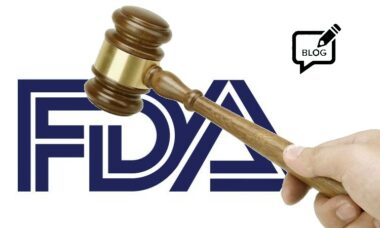 The US Food and Drug Administration (FDA) recently sent its first round of letters concerning delta-8 THC to five companies. At the time, CBD-Intel wondered about the extent to which the FDA will take enforcement action against delta-8 products.
The US Food and Drug Administration (FDA) recently sent its first round of letters concerning delta-8 THC to five companies. At the time, CBD-Intel wondered about the extent to which the FDA will take enforcement action against delta-8 products.
In other words, was it going to start heavily targeting the sale of delta-8 products or would it take an approach similar to what has been seen with CBD – where the FDA maintains that products should not be on the market but really only takes action against egregious violators of rules governing health claims?
And looking at the letters, that still seems the most likely. Most look like they could have been written from the same standard text, just with mentions of “and delta-8” added in every time CBD products were mentioned.
There were the same criticisms of many of the same health claims – varying from Covid to cancer to anxiety. There were the same warnings about the use of unapproved ingredients in dietary supplements. There were the same warnings that products were being marketed as unapproved new drugs.
There were, though, a few notable, small differences. Much more was made about animal products in general than seemed to be the case in previous letters. And one letter made specific mention of the sale of products intended for livestock, which was a possible first.
Perhaps, rather than a crackdown on delta-8, the FDA will be moving to look at more animal-targeted CBD products going forward.
Focus remains on the most ‘outrageous health claims’
However, chances are really that these letters mark an acknowledgment of delta-8 on the market by the FDA, but – like in previous never-before-seen FDA letters – the focus will remain on those making the most outrageous of the health claims rather than the companies looking to sell within the current letter of the law (regardless of opinions on whether cannabinoid companies should be permitted to market products using health claims).
This likely means going forward much the same treatment will be applied to delta-8 products. This suggests the FDA is less concerned about their appeal as a potential “legal high” esque product that can have an intoxicating effect within the letter of the law and more concerned with companies that are attempting to market it as a cure-all.
That would also seemingly fit in with the Drug Enforcement Administration (DEA)’s recent comments on the legality of the sale of delta-8 – though whether it does or not, it would be hardly the first time two government agencies took different positions on a subject.
The one caveat to that is the FDA did highlight that it had concerns with the potential safety of the delta-8 extraction process. It said it was “concerned about the processes used to create the concentrations of Delta-8 THC claimed in the marketplace” and mentioned that it had received reports of adverse effects.
This is seemingly more than the “ivory tower” style debate on CBD stemming from the FDA’s claims it cannot do anything about regulating the substance without congressional action to change the US Food, Drugs and Cosmetics Act’s prohibition of the use of any active ingredient in an approved drug in non-pharmaceutical ingestible products.
Whether that is a big enough difference to warrant further FDA action on delta-8 for more than unjustified health claims will be seen. But based on the initial flurry of letters, it looks unlikely.
– Freddie Dawson CBD-Intel staff







